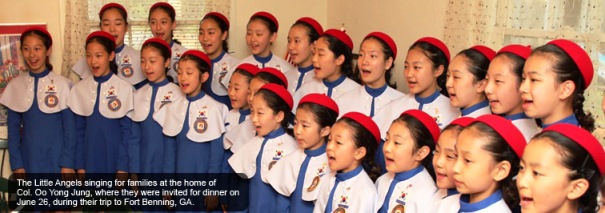![]()
The Words of the Selle Family
|
|
The Words of the Selle Family |

What a contrast to see fresh-faced Korean girls in dainty white-and-blue suits and red berets next to square-jawed military men in battle fatigues!
Such was the picture presented, with variations, at several appearances by the Little Angels Children's Folk Ballet of Korea in the Columbus, GA., area, which is home to Fort Benning, a huge community of 120,000 soldiers and dependents. The 33 girls and 1 boy visited the base twice on Saturday, June 26, and then performed at a theater in Columbus on Sunday, June 27.
On Saturday, the children, dressed in their red, white and blue traveling suits, were treated to lunch in a private dining room at the National Infantry Museum cafeteria. Col. Camp, who oversees the museum, spoke to the Little Angels and gave them a warm welcome. After the children tucked away a substantial lunch, they were escorted downstairs to the museum exhibits. Guides, including Col. Gary Camp himself, led the kids around and explained everything to them with the aid of interpreters on the Little Angels staff.
The museum offered elaborate dioramas and multimedia displays, including video clips, that showed the history of America's warfare, focusing especially on the infantry. A well-known saying the colonel quoted was, "The infantry owns the last 100 yards." That means that naval and air operations can take a battle only so far toward success. It's up to infantry soldiers to claim the final ground that brings the ultimate victory. Visitors got a feeling from the exhibits as to what grueling training it takes to develop the unit camaraderie and steely resolve to accomplish military objectives -- and also what kind of sacrifice of blood and treasure it takes.
For dinner, the Little Angels were invited to the Fort Benning home of Col. Oo-Yong Jung, the Republic of Korea Army liaison to the base leadership. He had done a great deal of preparation work to bring the troupe to the fort. The home of a colonel at the fort is spacious and comfortable, shaded by stately live oaks that thrive in the steamy Georgia climate. The children had a wonderful time, practicing their limited English with kids and adults from the base and eating from a buffet of intercultural foods that included kimchi, bulgogi, fried chicken, and turkey with stuffing, and drinking Korean corn water and Southern sweet tea.
The children chatted and giggled with one another, but the time came when the Little Angels were called by Dr. Bo Hi Pak to assemble in the dining room to regale the host families with song. On the foundation of their delectable meal, they did so with flair and joy, singing several songs, among them "Arirang" and "God Bless America."
In the afternoon of the next day, following a morning rehearsal, the Little Angels gave their usual breathtaking and heartwarming performance, which was attended by streams of soldiers clad in desert camouflage fatigues and by officers in their dress uniforms, along with many GI families, veterans, and Columbus citizens.
But at the very beginning of the program at the city's River Center for the Performing Arts, Dr. Pak strode onstage and introduced the Little Angels and the purpose of their 16-nation tour. He recounted his experiences in the early days of the Korean War, and how he, a wet-behind-the-ears 20-year-old company commander, was sent to Fort Benning to receive infantry officer training. He noted how valuable the training was -- for himself and for his entire nation.
"When Fort Benning trainees returned to Korea," he said, "it was like a transfusion that gave the patient new blood, new life. Fort Benning officer trainees became the backbone of the Korean Army. I firmly believe that Fort Benning training nothing less than saved Korea!"
Since then, he said, he's never forgotten the Infantry School motto: "Follow me!" From then until now, his 59th year homecoming to Fort Benning, he said, the "Follow me!" spirit has been his guide and inspiration.
"Because of the committed help of America," he explained, "the Republic of Korea today has freedom, democracy and even prosperity. Millions of children, like the Little Angels whom you will see shortly, grow up happy. Why did I bring children today? Because children were those who suffered the most during the Korean War. And American soldiers helped them the most, even during combat. So the children especially want to say, 'Thank you, America!'"
The sentiments expressed by Dr. Pak may go some way toward resolving the tension, noted at the start of this story, between innocence and aggressiveness, peace and war. Perhaps sometimes, in rare situations of emergency, the sword, even though it's evil, must be unsheathed in order to prevent much greater evil. Certainly that was the case in the Korean War, which stopped the enslavement of an entire nation.